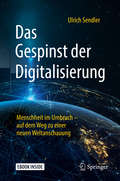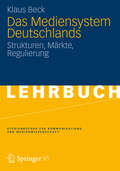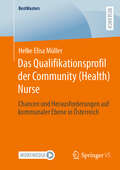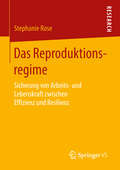- Table View
- List View
Das Ende der Heterodoxie?: Die Entwicklung der Wirtschaftswissenschaften in Deutschland (Wirtschaft + Gesellschaft)
by Arne Heise Henrike Sander Sebastian ThiemeIn dem vorliegenden Buch wird die Entwicklung nach der Reformphase deutscher Universit#65533;ten in den 1960er und 1970er Jahren, die im Zuge der Studentenbewegung eine Pluralisierung der #65533;konomik ansto#65533;en wollte, aufgearbeitet und die Gr#65533;nde f#65533;r die Marginalisierung alternativer #65533;konomischer Theorien offengelegt.
Das Experiment in der Kommunikations- und Medienwissenschaft: Grundlagen, Durchführung und Auswertung experimenteller Forschung (Studienbücher zur Kommunikations- und Medienwissenschaft)
by Thomas Koch Christina Peter Philipp MüllerDas Lehrbuch bietet einen umfassenden Überblick über das sozialwissenschaftliche Experiment. Es stellt Grundlagen und zentrale Begriffe vor und dient als praktischer Leitfaden, um Experimente durchzuführen. Mit zahlreichen Beispielen aus der Kommunikationswissenschaft liefert dieses Buch eine umfassende Hilfestellung für Methodenkurse und empirische Forschungsprojekte, die sich der experimentellen Forschung widmen.
Das Formular (AdminiStudies. Formen und Medien der Verwaltung #1)
by Niels Werber Peter Plener Burkhardt WolfWenn stimmt, was bereits Friedrich Schiller beklagt hat: dass der Mensch in der modernen Gesellschaft „zum Formular geworden“ ist, dann steht mit diesem unscheinbaren Verwaltungs-tool nichts weniger als unsere Lebenswirklichkeit auf dem Spiel. Der erste (Open Access-)Band der Reihe AdminiStudies beschäftigt sich deshalb mit der Funktion und Geschichte von Formularen, jenen institutionalisierten Lückentexten, die den Alltag der Bürger dadurch entscheidend prägen, dass sie die Befehlsgewalt des Staats und seinen Willen zum Wissen auf zwingende Weise verschränken. Von Blanketten und handgeschriebenen Formularbüchern über Vordrucke zur militärischen und steuerlichen Erfassung bis hin zu den Telegramm-Vorlagen des 19. Jahrhunderts und zu den digitalen Schreibfeldern heutiger Ämter und Social Media reicht die Macht- und Mediengeschichte des Formulars. Die Grenze zwischen Untertanen, Bürgern und Kunden ist durchlässig geworden, und an den Affordanzen digitaler Formulare lassen sich die gegenwärtigen Bauformen administrativer Herrschaft ablesen.
Das Führungsteam: Wie wirksame Kooperation an der Spitze gelingt
by Olaf HinzEinsame Helden in den Chefetagen - das ist weder zeitgemäß noch erfolgversprechend, denn die Themen sind zu vielfältig, die Fragestellungen zu komplex und die zu treffenden Entscheidungen zu zahlreich. Führungsteams sind auf dem Vormarsch - und sie sind nicht nur erfolgreicher, sondern auch gelassener und zufriedener. Wie aber können Manager ein wirksames Team bilden und ihre Unterschiede bewusst nutzen, ohne ihren individuellen Erfolg zu vernachlässigen? Olaf Hinz gibt Denkanstöße, konkrete Anregungen und liefert einen praxiserprobten Prozess, wie ein wirksames Führungsteam entsteht. Er zeigt die notwendige Haltung und behandelt auch die Themen Macht, Einfluss, Unternehmenspolitik und Eitelkeiten.
Das Gelingen von Anpassungsprozessen an den Klimawandel: Instrumente, Strategien und mediative Methoden der Prozessbegleitung im öffentlichen Bereich
by Christa Fischer-KorpDieses Buch gibt Hilfestellungen für Gemeinden, um die mit dem Klimawandel verbundenen Herausforderungen zu meistern und dabei alle Interessensgruppen zu beteiligen. Fast alle Gemeinden stehen vor der Frage, wie die Anpassung an den Klimawandel für die Bürger vonstattengehen soll. Jede Gruppe, jede Institution, jeder Betrieb wird Bedürfnisse artikulieren und die eigenen Interessen verteidigen. Das Buch zeigt auf, wie in den Kommunen Konfliktfähigkeit hergestellt werden kann, wie die Herausforderungen für Gemeinden und Regionen analysiert und maßgeschneiderte Strategien für den Anpassungsprozess entwickelt werden können. Der Anpassungsprozess an den Klimawandel muss so gestaltet werden, dass Bedürfnisse beachtet werden und Interessen nach Möglichkeit ausgeglichen sind. Es braucht Kooperationen, Innovationen und den Blick für Synergien, um diese Aufgabe zu bewältigen. Ein besonderer Schwerpunkt liegt hier auf der Begleitung und Unterstützung durch Mediatoren. Die Autorin gibt den Verantwortlichen zahlreiche Praxisbeispiele, Analyse-Tools und Checklisten an die Hand. Damit wendet sich das Buch vor allem an Bürgermeister, Gemeindeverantwortliche, Klimabeauftragte, Anbieter von „grünen“ Projekten und an alle, die wollen, dass die Anpassung an den Klimawandel gelingt.
Das Gespinst der Digitalisierung: Menschheit im Umbruch – auf dem Weg zu einer neuen Weltanschauung
by Ulrich SendlerÜbernehmen bald die Roboter? Hat die Menschheit noch eine Zukunft? Und was hat das mit der Ausbreitung des Populismus zu tun? Das Buch spannt einen Bogen von der Digitalisierung zu aktuellen gesellschaftspolitischen Umbrüchen. Übersichtlich strukturiert und leicht verständlich geschrieben, hilft das Buch Lesern, das Wesen der digitalen Transformation zu begreifen – unter anderem, indem es Parallelen zur industriellen Revolution aufzeigt. Für seine Analyse verknüpft der Autor die Digitalisierung mit politischen, historischen, wirtschaftlichen, soziologischen und philosophischen Fragestellungen.Nach seiner Analyse gehen die gegenwärtigen Angriffe auf die Demokratie und deren schwache Abwehr in den Industrieländern nicht zufällig mit der Digitalisierung von Wirtschaft und Industrie einher: Sie sind zwei Seiten derselben Medaille. In seinem Rückblick auf die Geschichte zeigt er, auf welche Art und Weise gesellschaftliche Phänomene wie Klassenkampf, Nationenbildung und Demokratisierung mit dem Industriezeitalter verwoben sind. Er beschreibt, wie die Digitalisierung spätestens seit den Siebzigerjahren des 20. Jahrhunderts mit der massenhaften Herstellung von Mikrochips die Welt erobert. Diese Entwicklung ist so weit fortgeschritten, dass mittlerweile fast alle privaten und öffentlichen Bereiche des Lebens von der Digitalisierung geprägt sind. Ulrich Sendler verknüpft seine Schilderung mit politisch-gesellschaftlichen Umbrüchen, von der Revolte der 68er bis zum neoliberalen Gesellschaftsentwurf. Der Begriff Digitalisierung, so seine These, beschreibt den Übergang der Gesellschaft zu etwas Neuem, das durch die Allgegenwart des Digitalen bestimmt sein wird. Und diese Transformation könnte sich, ebenso wenig wie die Industrialisierung, nicht ohne Revolten vollziehen. Das Buch sagt nicht vorher, was auf uns zukommt. Es stellt Zusammenhänge her, hilft aktuelle Entwicklungen zu verstehen und sich eine eigene Meinung zu bilden. Ulrich Sendler, seit mehr als drei Jahrzehnten als Fachjournalist, Technologieanalyst und Autor rund um die Digitalisierung der Industrie tätig, will eine Debatte über das anbrechende digitale Zeitalter anstoßen. Damit richtet sich das Buch nicht nur an Politiker, Wissenschaftler und Praktiker, sondern insbesondere an interessierte Bürger.
Das Google+ Buch
by Annette SchwindtVon vielen sehnsüchtig erwartet: Die übersichtliche und umfassende Anleitung zu Google+ von der Autorin des Bestsellers "Das Facebook-Buch", Annette Schwindt. Google+ ist so schnell durchgestartet wie keine andere Social Media-Plattform zuvor. Immer mehr Menschen tummeln sich in dem noch jungen sozialen Netzwerk und können dabei immer mehr von der Integration zentraler Google-Dienste wie der Suche profitieren. Wie das geht, erklärt Annette Schwindt ebenso wie die Einrichtung des Profils, die richtigen Privatsphäreeinstellungen, Google+-spezifische Aktivitäten wie Hang-outs und vieles mehr.
Das Image der Päpste: Pius XII., Johannes XXIII. und Paul VI. in bundesdeutschen Printmedien
by Thomas WegenerWie jede öffentlichkeitssuchende Institution oder Person legen auch die katholische Kirche und ihre Päpste großen Wert auf das eigene Image. Dabei weicht die intendierte Selbstdarstellung oftmals von der medialen Wahrnehmung ab oder steht ihr sogar diametral entgegen. Ganz gleich ob Pius XII. als „Hitlers Papst“, Johannes XXIII. als „Revoluzzer“ oder Paul VI. als „Antipillenpapst“ – es existieren eine Fülle von außen zugetragener printmedialer Papst-Images, deren Entstehung, Verlauf und Brüche es in diesem Buch mithilfe einer mediensemiotischen, textbasierten Methodik auszumachen und nachzuzeichnen gilt.
Das Individuum der Sozialen Arbeit: Ein Beitrag zur Soziologie der Sozialen Arbeit
by Marcel KrebsDie Evolution von Gesellschaft führt zu unterschiedlichen Differenzierungsformen, die immer auch als Neu-Arrangierung des Verhältnisses gelesen werden kann, welches die Gesellschaft zum Individuum einrichtet. Diese These wird im vorliegenden Buch mittels zweier Studien entlang der Werke von Émile Durkheim und Niklas Luhmann ausführlich ausgearbeitet. Beiden theoretischen Zugängen ist gemein, dass sie die Individualität des «modernen» Individuums nicht als Kompositum der Gesellschaft begreifen, vielmehr hat das Individuum seinen Standort in sich selbst und somit ausserhalb der Gesellschaft. Trotz dieser extrasozietalen Verortung bleibt Individualität gesellschaftlich verursacht, Individuen sind für die Ermöglichung und den Erhalt ihrer Individualität konstitutiv auf soziale Systeme und Inklusion angewiesen.Die Soziale Arbeit findet ihr gesellschaftliches Bezugsproblem in diesem Sachverhalt, indem sie Individualität als Kehrseite partieller Multiinklusion reflektiert und als bearbeitbare Grösse betrachtet. Ihr geht es – zumindest dann, wenn sie mehr will als nur das biologische Überleben der «Überflüssigen» zu verwalten – um das Arrangement der Inklusionen und hier um die Frage, wie Individualität auf eine gerechte Weise ermöglicht, entwickelt und stabilisiert werden kann.
Das Interpretative Paradigma: Eine Einführung
by Reiner KellerDas Buch führt in die Grundlagen soziologischer Theorie- und Forschungsperspektiven des Interpretativen Paradigmas ein. Mit diesem Begriff sind Ansätze bezeichnet, in denen die Fähigkeiten und Notwendigkeiten des Menschen, sich Welt deutend und handelnd zu erschließen, zum Ausgangspunkt der Analyse - meist in Gestalt qualitativer Sozialforschung - gemacht werden. Soziologie wird hier - schon lange vor den Cultural Studies - als ,Kulturwissenschaft' begriffen und betrieben.
Das Interview: Grundlagen und Anwendung in Psychologie und Sozialwissenschaften (Basiswissen Psychologie)
by Nora-Corina Jacob Karl-Heinz RennerDieses praxisnahe Lehrbuch bietet eine verständliche Einführung in die Grundlagen und Anwendung des Interviews – des in der Psychologie am häufigsten eingesetzten Instruments zur Datenerhebung. Konzeption, Durchführung und Auswertung von Interviews zählen deshalb zu den diagnostischen Routinetätigkeiten, die im Studium der Psychologie vermittelt werden – z.B. in Form eines Seminars, für welches das vorliegende Buch hervorragend als Begleitlektüre geeignet ist. Aber auch Forschende sowie Praktikerinnen und Praktiker finden hier hilfreiche Grundlagen und Tipps zur praktischen Durchführung von Interviews.
Das KOKO-Prinzip: KOnflikt und KOoperation - das unzertrennliche Paar
by Niki Harramach Nina Veličković Manfred KohlheimerDer ungeliebte Bruder KOnflikt genießt viel mehr Aufmerksamkeit als die viel beliebtere Schwester KOoperation. Pervers genug, oder? Im Endeffekt sind es aber die beteiligten Parteien, die entscheiden, ob in einer konkreten Situation mehr konfligiert oder kooperiert wird – und auch in welchem wie immer balancierten Ausmaß. Wenn das KOKO-Prinzip nicht ausreichend und rechtzeitig im Bewusstsein aller beteiligten Parteien verankert ist und in der KOKO-Regelung nicht entsprechend berücksichtigt wird, ist eine nachhaltig erfolgreiche Regelung der KOKO-Situation eher ein Glücksfall (meist das Gegenteil) als das Ergebnis einer professionellen Vorgangsweise.Weil die Aufmerksamkeit erwiesener Maßen mehr auf den KOnflikt- als den KOoperationscharakter der Situation gerichtet ist, müssen alle beteiligten Parteien zuerst die mögliche KOop-Seite durchexerzieren! Das ist ungewohnt aber notwendig, um dem evidenten KOnflikt-Bias zu entgehen.Dieses Buch ist kein Friedensbuch, aber auch keine bloße Kampfanleitung. Es folgt dem Grundsatz: „Wer den Kampf nicht kann, kann den Frieden nicht haben!“
Das Konzept „Starke Sprache“: Wie Sie mit klaren, wirksamen Formulierungen Ihre Ziele erreichen (essentials)
by Sven Pastoors Lars MeyerWer etwas Interessantes zu sagen hat, dem hören sowohl Kunden als auch Kollegen gerne zu. Die Art und Weise, wie wir kommunizieren, ist somit entscheidend für unseren beruflichen und privaten Weg. Zudem hängt das Maß, wie kompetent und glaubwürdig uns unsere Gesprächspartner einschätzen, maßgeblich vom Gebrauch unserer Sprache ab. In sechs Kapiteln vermitteln die Autoren in diesem essential ihren Lesern die Grundlagen starker, wirksamer Sprache. Der Fokus liegt dabei auf einer klaren und deutlichen Ausdrucksweise. Dies ist eine wichtige Voraussetzung für erfolgreiches Kommunizieren, Verhandeln und Diskutieren.
Das Mediensystem Deutschlands: Strukturen, Märkte, Regulierung (Studienbücher Zur Kommunikations- Und Medienwissenschaft Ser.)
by Klaus BeckDiese Einführung bietet eine historisch fundierte (ab 1945) systematische Darstellung der Grundstrukturen des bundesdeutschen Mediensystems und seiner kommunikationspolitischen Genese, insbesondere der ökonomischen, rechtlichen und technischen Grundlagen und Funktionsweisen der Medien der öffentlichen Kommunikation Printmedien, Rundfunk, Film, Online-Medien) sowie der medien-übergreifenden Strukturen/ Rahmenbedingungen (Nachrichten-, PR- und Werbeagenturen) sowie TK-Dienstleister. Darüber hinaus werden komparatistische Bezüge zu den Mediensystemen Österreichs und der Schweiz sowie Basisinformationen zu diesen beiden Mediensystemen hergestellt.
Das Mediensystem Deutschlands: Strukturen, Märkte, Regulierung (Studienbücher zur Kommunikations- und Medienwissenschaft)
by Klaus BeckDiese Einführung bietet eine historisch fundierte (ab 1945) systematische Darstellung der Grundstrukturen des bundesdeutschen Mediensystems und seiner kommunikationspolitischen Genese, insbesondere der ökonomischen, rechtlichen und technischen Grundlagen und Funktionsweisen der Medien der öffentlichen Kommunikation Printmedien, Rundfunk, Film, Online-Medien) sowie der medien-übergreifenden Strukturen/ Rahmenbedingungen (Nachrichten-, PR- und Werbeagenturen) sowie TK-Dienstleister. Darüber hinaus werden komparatistische Bezüge zu den Mediensystemen Österreichs und der Schweiz sowie Basisinformationen zu diesen beiden Mediensystemen hergestellt.
Das Mensch-Tier-Verhältnis: Eine sozialwissenschaftliche Einführung
by Renate Brucker Melanie Bujok Birgit Mütherich Martin Seeliger Frank ThiemeDas Mensch-Tier-Verhältnis ist in modernen Gesellschaften durch Ambivalenzen gekennzeichnet. Auf der einen Seite als Ding und Material benutzt und fabrikmäßig aufbereitet, werden Tiere andererseits als eigenständige Subjekte und Teil konkreter Sozialbeziehungen mit Menschen wahrgenommen. Das Buch soll - erstmals als sozialwissenschaftliche Einführung - einen Querschnitt der aktuellen Forschung zum Mensch-Tier-Verhältnis bieten. Die Autorinnen und Autoren folgen dabei ihren unterschiedlichen Schwerpunkten und veranschaulichen u. a. aus sozialhistorischer, kulturwissenschaftlicher und herrschaftssoziologischer Perspektive die Breite dieses Themas und seine Verflochtenheit mit anderen Forschungsgebieten.
Das Phänomen Vertrauen in der Einzelberatung: Erkenntnisse zu und Bedeutung von Vertrauen in systemischer Einzelberatung, Coaching, Supervision, Seelsorge und ähnlichen Settings (essentials)
by Esther KuhnVertrauen ist nicht nur in Beratungssettings, sondern auch in allen zwischenmenschlichen Beziehungen essenziell. Dieses essential bietet eine fundierte und präzise Einführung in das Phänomen Vertrauen aus systemischer Sicht. Zudem wird entlang den Phasen eines Beratungsprozesses die Bedeutung von Vertrauen analysiert und entfaltet. Die Erkenntnisse werden für die beraterische Praxis fruchtbar gemacht. Nach diesem Essential ist klar, warum Vertrauen ein Schlüssel für Beratung ist.
Das Prinzip Glück (essentials)
by Robert HettlageRobert Hettlage umreißt in seinem Essential, was es mit dem ,,großen", vernunftgesteuerten Glück auf sich hat. Dass alle Menschen nach dem Glück streben, gilt als selbstverständlich. Macht, Schönheit, Reichtum und Anerkennung stehen zwar als Ziele hoch im Kurs, bedürfen aber eines langen Atems und/oder sind schwer zu beeinflussen. In der modernen Welt scheint also eine Ratlosigkeit vorzuherrschen, die keinen anderen Ausweg weiß, als jeden Menschen individuell zum Schmied seiner Zufriedenheit und seines Wohlergehens zu erklären. Dadurch wird der Weg zu einer langen Tradition der Glücksphilosophie verbaut, die nicht bei der seelischen Befindlichkeit ansetzt, sondern bei der inneren, ,,notwendigen und hinreichenden" Qualität der Glücksgüter. An diesen Qualitäten und der trainierten Haltung ihnen gegenüber (Tugenden) bemisst sich die Lebenskunst. Obwohl Max Weber in seinen soziologischen Analysen die Entwicklung zu modernen Kontingenz, Wertpluralität und Individualität für unabwendbar und schicksalhaft erklärt, zeigen seine Erörterungen zur ,,Lebensführung", dass diese an das vormoderne Konzept der Lebenskunst anschließen kann.
Das Protokoll (AdminiStudies. Formen und Medien der Verwaltung #2)
by Niels Werber Peter Plener Burkhardt WolfProtokolle stehen im Zentrum unterschiedlichster (interaktiver, papierener oder auch elektronischer) Verwaltungsoperationen: Sie halten ebenso fest, was gesagt und beschlossen wurde, wie sie festlegen, was wie zu tun ist. Sie strukturieren, regulieren und dokumentieren Sprech- und Handlungsabläufe von ministeriellen Zusammenkünften, Gerichtsterminen und anderen komplexen Arbeitsprozessen. Seit Jahrhunderten schreiben Protokolle auf und vor, was zu tun und was zu lassen ist, was als notwendig gilt oder als unwichtig und marginal. Sie filtern aus komplexen Interaktionen das heraus, was jene Vergangenheit gewesen sein wird, auf die man sich künftig bezieht. Dabei arbeiten Protokolle letztlich ein und demselben Zweck zu: dass – auf begründete und regelgeleitete Weise – überhaupt etwas entschieden wird. Vor diesem Hintergrund und mit verwaltungshistorischen und soziologischen ebenso wie medien-, kultur- und literaturwissenschaftlichen Perspektiven greift der zweite Open Access-Band der AdminiStudies drei Hauptformen dieses Verwaltungsmediums auf: Gesprächs- bzw. Verlaufsprotokolle, diplomatische und technische Protokolle.
Das Qualifikationsprofil der Community: Chancen und Herausforderungen auf kommunaler Ebene in Österreich (BestMasters)
by Helke Elisa MüllerIn diesem Buch wird das Qualifikationsprofil der Community (Health) Nurses untersucht, die seit 2022 im Rahmen eines Pilotprojekts in Österreich tätig sind. Ziel ist es, Chancen und Herausforderungen aus der Perspektive der Community (Health) Nurse zu analysieren, um den Implementierungsprozess zu optimieren. Durch qualitative Interviews mit Expert*innen wurde ermittelt, dass Community (Health) Nurses über unterschiedliche Kompetenzen verfügen, jedoch bei vorrangig benötigten Fähigkeiten Defizite vorhanden sind. Eine Anpassung des nationalen Qualifikationsprofils wird als notwendig erachtet. Die Ergebnisse weisen darauf hin, dass sowohl förderliche als auch hemmende Faktoren berücksichtigt werden sollten, um die erfolgreiche Implementierung von Community (Health) Nursing zu gewährleisten.
Das Radikalisierungsparadigma: Eine analytische Sackgasse der Terrorismusbekämpfung? (essentials)
by Michail LogvinovDie kritische These dieses essentials geht davon aus, dass das Radikalisierungsparadigma die Terrorismusbek#65533;mpfung an den Rand einer epistemischen Krise brachte. Denn es blendete zahlreiche Radikalisierungsmechanismen und -faktoren jenseits der verd#65533;chtigen Gemeinschaften aus. Vor allem aber lenkte die wahrnehmungsdominante Perspektive auf ein ideologisch-theologisches Ph#65533;nomen als ,terroristischen N#65533;hrboden' von den eigentlichen Gef#65533;hrdern, klandestinen Netzwerken und konspirativ Radikalisierten ab. So entstand das so genannte ,tunnel investigation syndrome', das die Analytiker in einigen F#65533;llen daran hinderte, terrorismusrelevante Entwicklungen zu reflektieren.
Das Recht auf sexuelle Mikrodiversität: Eine soziohistorische Untersuchung
by Felipe RankeIn diesem Buch wird die These vertreten, dass die fortschreitende Beziehung zwischen der als vielfältiges Phänomen verstandenen Sexualität und den Grund- und Menschenrechten die wichtigste strukturelle Bedingung war, die die Schwächung von traditionellen Strukturen ermöglicht hat. Der Band enthält eine Fülle von empirischen Belegen für diese These. Dazu zählt die Identifizierung einer ersten Welle der Entkriminalisierung mikrodiverser Sexualitäten in der Weltgesellschaft nach der Französischen Revolution und den Napoleonischen Kriegen durch die Einführung des Schadensprinzips als Rechtfertigung für die Strafverfolgung. Solange sexuelle Beziehungen zwischen Männern keinen objektiven Schaden verursachten, sollten sie von der Strafverfolgung ausgenommen werden. In dem Band wird auch ausführlich erörtert, wie die Ausweitung der Verfassungsgerichtsbarkeit auf nationaler und supranationaler Ebene nach dem Zweiten Weltkrieg zu einem Mechanismus zur Förderung der sexuellen Vielfalt wurde, ohne dass das politische System dabei zwangsläufig eine proaktive Rolle einnehmen musste. Dies stellt die zweite und bis heute andauernde Welle der Entkriminalisierung mikrodiverser Sexualitäten in Bezug auf deren Handlungen, Darstellungen und Zustände dar. Über 200 empirische Beispiele der Rechtsprechung aus dem lateinamerikanischen und europäischen Raum illustrieren diesen Wandel.
Das Reproduktionsregime: Sicherung Von Arbeits- Und Lebenskraft Zwischen Effizienz Und Resilienz
by Stephanie RoseDieses Buch geht der Frage nach, wie angesichts einer viel diskutierten Reproduktionskrise die alltägliche Reproduktion und Regeneration gewährleistet werden kann. Die Autorin entwickelt durch die konzeptionelle Neusortierung des Forschungsstandes das Reproduktionsregime als neues Analysekonzept. Der analytische Mehrwert des Reproduktionsregimes entsteht durch die integrierte Betrachtung von politischen Reformen, darauf gründenden personalpolitischen Maßnahmen, individuellen Bewältigungsstrategien und den dahinterstehenden, für verschiedene Beschäftigtengruppen sehr unterschiedlich ausgeprägten Ressourcen. Symptome der Reproduktionskrise sind neben der Zunahme psychischer Belastungen und Erkrankungen eine steigende Zahl erwerbsunfähiger Menschen und der Anstieg von Arbeitsausfällen. Eine nachhaltige Sicherung der alltäglichen Reproduktion scheint vielen Menschen gegenwärtig nicht mehr möglich zu sein.
Das Schweigen beenden – Beiträge zur Aufarbeitung sexuellen Kindesmissbrauchs (Sexuelle Gewalt in Kindheit und Jugend: Forschung als Beitrag zur Aufarbeitung)
by Sabine Andresen Daniel Deckers Kirsti KriegelDie Texte in diesem Band von Wissenschaftlerinnen und Wissenschaftlern, von Aktivisten und betroffenen Menschen und Journalisten widmen sich verschiedenen Aspekten der Aufarbeitung sexuellen Kindesmissbrauchs insbesondere unterschiedlichen Tatkontexten wie der Familie, dem Sport, Schulen oder den Kirchen. Sexueller Kindesmissbrauch geschieht in allen Bereichen unserer Gesellschaft, in denen Kinder aufwachsen. Dennoch ist das Thema weitgehend tabuisiert. Die Aufarbeitung sexueller Gewalt trägt dazu bei, die Gesellschaft zu sensibilisieren, vergangenes Unrecht sichtbar und die Stimmen betroffener Menschen hörbar zu machen. Der Blick in die Vergangenheit ist notwendig, um erkennen, warum die Gewalt geschehen konnte, warum Kindern nicht geholfen, weggeschaut, vertuscht und geschwiegen wurde, aber vor allem, damit wir wissen, wie wir Kinder und Jugendliche in Zukunft besser schützen können.
Das Schweigen beenden: Beiträge zur Aufarbeitung sexuellen Kindesmissbrauchs (Sexuelle Gewalt in Kindheit und Jugend: Forschung als Beitrag zur Aufarbeitung)
by Sabine Andresen Daniel Deckers Kirsti KriegelDie Texte in diesem Band von Wissenschaftlerinnen und Wissenschaftlern, von Aktivisten und betroffenen Menschen und Journalisten widmen sich verschiedenen Aspekten der Aufarbeitung sexuellen Kindesmissbrauchs insbesondere unterschiedlichen Tatkontexten wie der Familie, dem Sport, Schulen oder den Kirchen. Sexueller Kindesmissbrauch geschieht in allen Bereichen unserer Gesellschaft, in denen Kinder aufwachsen. Dennoch ist das Thema weitgehend tabuisiert. Die Aufarbeitung sexueller Gewalt trägt dazu bei, die Gesellschaft zu sensibilisieren, vergangenes Unrecht sichtbar und die Stimmen betroffener Menschen hörbar zu machen. Der Blick in die Vergangenheit ist notwendig, um erkennen, warum die Gewalt geschehen konnte, warum Kindern nicht geholfen, weggeschaut, vertuscht und geschwiegen wurde, aber vor allem, damit wir wissen, wie wir Kinder und Jugendliche in Zukunft besser schützen können.
























